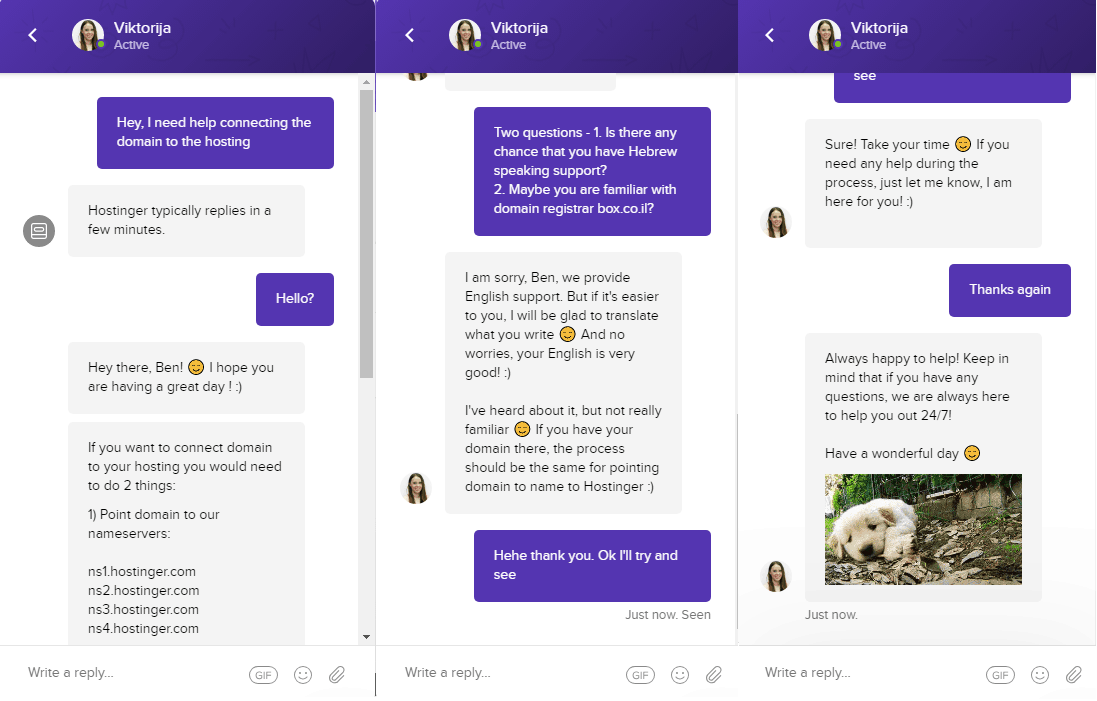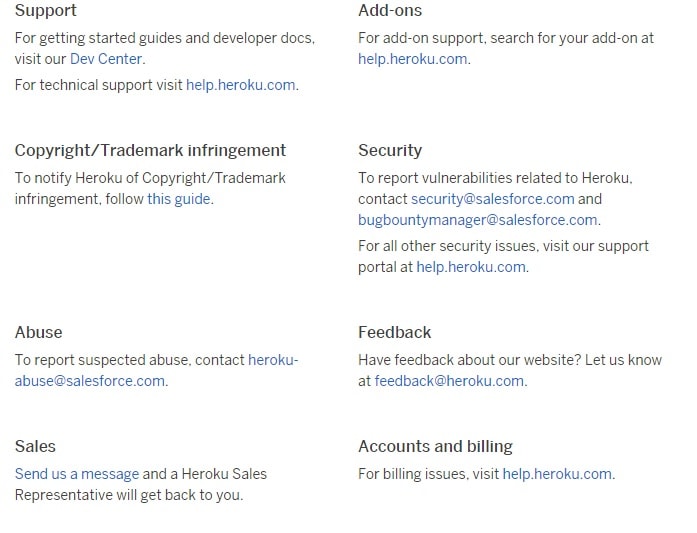Inside this Article
1. Plans and Pricing
Hostinger is for beginners; Heroku is for developers
Hostinger offers a wide range of hosting services starting from shared, WordPress, and email hosting to cloud hosting and VPS. In contrast, Heroku’s container-based cloud PaaS supports multiple programming languages such as Java, Ruby, PHP, Python, Scala, Node.js, Go, and Clojure. Heroku also offers data services and private spaces. For this comparison, I’ve focused on the Heroku Postgres cloud DBaaS (Database-as-a-Service). These are available in 5 types – Hobby, Standard, Premium, Private, and Shield with each having a varying price range. Though the cheapest plan begins free (with 10K rows), Heroku pricing rises sharply as you need higher resource allocations and have to scale up your resources. Due to their different nature, it’s difficult to compare these plans directly to Hostinger’s shared hosting plans as you can’t call the latter Heroku alternatives. Still, it’s important to know that Hostinger’s starting shared plan is available at an almost free price. Its cloud hosting plans (available in 3 categories) cost cheaper overall (considering you opt for the longest quadrennial term). Hostinger gives you a 30-day money-back guarantee. Heroku doesn’t offer any refunds though. Hostinger Web Hosting
Plan NameStorageBandwidthFree SSLNumber of SitesPriceFree Months
More detailsA free domain name is included with some hosting plans from Hostinger
Heroku Cloud Hosting
Plan NameStorageRAMPrice
More details2. Features
Better resource allocations and several user-friendly features tilt the scales in favor of Hostinger
Hostinger’s cloud plans offer CloudLinux OS, free SSL, SSD storage, a free domain for 1 year, 1X-4X speed boost, free CDN, 1-click app installer with 100+apps, custom-made and pioneering hPanel, free automated daily backups, free migration, and multiple PHP version (5.2-7.4) support, among others. With Heroku’s Postgres cloud DBaaS, you’ll get database forks (for load testing, cloning your database with a single command, or testing new schema migrations), followers (read-only replicas of a database for horizontal scalability), dataclips (for data-backed business decisions), automated database health checks, data rollback with a single command, seamless integration in a Private/Shield Space with mutual and compliant TLS, full control and custody with BYOK (bring your own key), and Edge AWS CDN (as a paid add-on). You can compare these two web hosts by checking this comparison table.| Hostinger | Heroku | |
|---|---|---|
| Hosting Types | Shared, WordPress, and email hosting plus VPS and cloud hosting | Container-based cloud PaaS plus data services and private spaces |
| Free Domain | ✓ | × |
| Free SSL Certificate | ✓ | × |
| Disk Space | 200GB SSD-300GB SSD (cloud plans) | 68GB-3TB |
| Bandwidth | Unlimited | 120-500 connections |
| Automatic Backups | Daily | Daily/weekly/monthly |
| Control Panel | hPanel | Web dashboard |
| Email accounts | Unlimited | Not mentioned |
| Free CDN | ✓ | × |
| Free Site Migration | ✓ | × |
| Money-Back Guarantee | 30 days | × |
3. Performance
Hostinger delivers on its uptime guarantee SLA where Heroku doesn’t even offer one
Hostinger uses Tier-3 datacenters spread across 7 different global regions. It also utilizes 100% isolated VMs/containers for each customer, Cloudflare CDN, and SSD drives with RAID-10. Heroku uses ISO 27001 and FISMA-certified datacenters managed by Amazon and benefits from the AWS (Amazon Web Service) technology. It also uses burstable vCPU and disk space (plan-dependent), EBS-optimized instances, and higher availability through automatic failover (for Premium and above tiers).Hostinger offers a credit-backed 99.9% uptime guarantee. It had great loading speeds and uptime in our performance tests. Check the details at our expert Hostinger review.
Heroku offers a 99.5% to 99.95% uptime guarantee though there are no guarantees. However, high availably is on offer as the maximum downtime with the Premium plan is 15 minutes per month. For details, check our expert Heroku review.
Despite its impressive downtime, Heroku loses out to Hostinger’s superb performance.
4. Security
Robust security matters to both Hostinger and Heroku
Hostinger uses SSL certificate, automated daily backups, RAID-10, isolated resources, LVE containers, Cloudflare CDN, Bitninja/Imunify360 (WAF), Wanguard anti-DDoS protection, and prognostic server monitoring and maintenance. With Heroku, you’ll get firewalls, DDoS mitigation techniques, spoofing and sniffing protection, customer application isolation, vulnerability management, and automatic recovery of failed platform components (including databases and customer applications), among others. Thanks to comparable security measures, picking a clear winner in this round is difficult.5. Support
Hostinger doesn’t charge for its splendid support; Heroku makes you pay if you need fast support
Hostinger offers splendid support via 24/7 live chat, ticket, and email (logged-in users only). Those ready to pay an additional amount can even use its faster “Priority Support”. I received instantaneous replies when I used Hostinger’s live chat.

And…Hostinger Wins
Except for the security round where both these providers finish clinching a tie, Hostinger races ahead in all the other rounds – from features and performance to pricing and support. As a result, my vote goes to Hostinger. Choosing Hostinger is a wise option as it also features amongst the best web hosting services. But if you’re a developer or a student planning to test, deploy, manage, and scale apps, Heroku’s fully-managed container-based cloud PaaS could be worth a try.Comparison Table
Hostinger
Heroku
Plans and Pricing
Cheaper shared and cloud hosting along with WordPress hosting, email hosting, and VPS
Container-based cloud PaaS plus pricier data services (Postgres cloud DBaaS) and private spaces
Key Features
CloudLinux OS, free SSL, SSD storage, a free domain for 1 year, 1X-4X speed boost, free CDN, 1-click app installer with 100+apps, hPanel, free automated daily backups, free migration, and multiple PHP version (5.2-7.4) support
Databasee forks, followers, dataclips, automated database health checks, data rollback with a single command, seamless integration in a Private/Shield Space with mutual and compliant TLS, full control and custody with BYOK, and Edge AWS CDN (paid add-on)
Performance
Credit-backed 99.9% uptime guarantee; uses 100% isolated VMs/containers for each customer, Cloudflare CDN, and SSD drives with RAID-10
99.5% to 99.95% uptime; uses ISO 27001 and FISMA-certified datacenters managed by Amazon, burstable vCPU and disk space (plan-dependent), EBS-optimized instances, and higher availability through automatic failover (plan-dependent)
Security
SSL certificate, automated daily backups, RAID-10, isolated resources, LVE containers, Cloudflare CDN, Bitninja/Imunify360 (WAF), Wanguard anti-DDoS protection, and prognostic server monitoring and maintenance
Firewalls, DDoS mitigation techniques, spoofing and sniffing protection, customer application isolation, vulnerability management, and automatic recovery of failed platform components
Support
24/7 live chat, ticket, and email support plus Priority Support (paid); tutorials, blog, and knowledgebase for self-help
Free and paid premium support via email and tickets; community forum, blog, Help Center, Dev Center, Getting Started Guides, and podcasts for self-support








![8 Best Enterprise WordPress Hosting (Scalable & Reliable) [2025]](https://dt2sdf0db8zob.cloudfront.net/wp-content/uploads/2024/11/Best-Enterprise-WordPress-Hosting-1.png)
![8 Best Enterprise WordPress Hosting (Scalable & Reliable) [2025]](https://dt2sdf0db8zob.cloudfront.net/wp-content/uploads/2023/05/Caitlin-Greyling-150x150.jpg)






